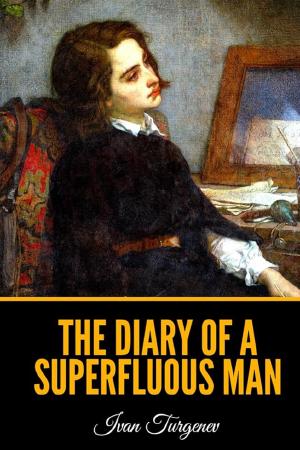The Diary of a Superfluous Man by Ivan Turgenev

People are bad, or good, clever, stupid, pleasant, and disagreeable… I’m superfluous and nothing more
Let us imagine, for a moment, that a doctor informs us we have only a few weeks left to live. Faced with such a revelation, we might feel urged to revisit and reinterpret the trajectory of our existence. We also could decide to write down the story of our life in an epistolary mode—not for others, but for ourselves, and because “just before the death it is a suitable thing to do”—maybe as an act of self-understanding. This is precisely the narrative frame of Ivan Turgenev’s short story about the thirty-year-old Tchulkaturin: The Diary of a Superfluous Man. Confronted with inevitable death due to an illness that is never mentioned—no decent man talks of his maladies—, Tchulkaturin cast back on his life and his role in the world, coming to see himself as a “superfluous man”, a figure to whom prime characteristic is their uselessness without a clear purpose in the social order of their time.
Although The Diary of a Superfluous Man is a short novel, it is considered an influential work that helped to define and popularize the concept of the “superfluous man” in Russian literature, becoming in this way, Tchulkaturin’s private confession into the concept that defined the archetype.
Tchulkaturin starts his story by tracing back the origin of his family as a middle-upper-class that eventually fell into disgrace. His father is depicted as a man without authority who abandoned himself to the vices even though he was self-aware of his own degradation. Tchulkaturin’s mother, by contrast, is described as a hardworking virtuous woman with a high stand moral, but ultimately unproductive in terms of her contribution to the family happiness. It is interesting that despite this, Tchulkaturin states that he did not love his virtuous mother, but passionately loved his vicious father. After his father’s demise, creditors demanded the debts accumulated by his passion for gambling leaving the family into financial ruin and social disgrace.
Later, in the provincial town of O., Tchulkaturin encounters Kirilla Matveitch Ozhogin, a local chief functionary, who had a daughter, Elizaveta Kirillovna, to whom he becomes infatuated with. For a time, he believes his love is corresponded in some secret and subtle way. However, his hopes are shattered when he realizes she has fell for the aristocratic Prince N. This fact and his loves for Elizaveta, eventually leads Tchulkaturin in an impulsive way, to challenge Prince N. to a duel. Tchulkaturin wins causing Prince N. a mild injury in the head, but being outcasted by the town for his reckless behavior and hated by Elizaveta ever since. After a while, rumors begin circulating and everybody is expecting for Prince N. to propose to Elizaveta. However, one day Prince N. mysteriously vanishes, leaving Elizaveta dishonored and plunged into sadness and confusion. Although Tchulkaturin begins to frequent Kirilla Matveitch Ozhogin’s house again, hoping to revive some connection with Elizaveta, she remains completely indifferent to him, aware of his feelings, but unwilling to entertain them. Despite still loving Prince N., Elizaveta ends up agreeing to be the wife of Bizmyonkov, a petty official of the town.
I meant to write my diary, and, instead of that, what have I done? I have related one incident of my life
Immediately following Elizaveta’s decision, Tchulkaturin rethinks his role throughout the entire narrative, at last concluding that he played the “superfluous man” in every aspect of the story: the prince’s part, the Bizmyonkov’s part, and specially, the Elizaveta’s part. He also concludes that he has been nothing more than an extraneous figure, seeing himself as a senseless element that has always been left over. At the end of the novel he reproaches himself for having used the diary to recount only a single incident in his life, having no time for anything else in the face of the coming death.
Tchulkaturin comes across with the bleak realization that only with death does one cease to be superfluous. Perhaps this insight was Turgenev’s way of illustrating how deeply the “superfluous man” archetype had permeated the young Russian aristocracy of the 19th century. The fact that Tchulkaturin’s chosen story revolves around a failed love—where the object of his affection, Elizaveta, not only never reciprocated his feelings but was indifferent to him—underscores the central tragedy of his life and reveals the hollowness of his existence, showing how disconnected from the vital drama of his own existence he was, reflecting perhaps, a broader nihilism that had taken root in the aristocratic class of the time.